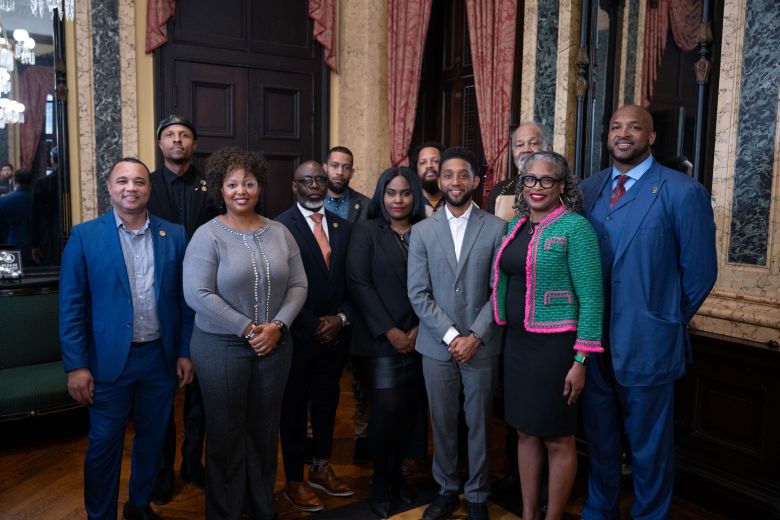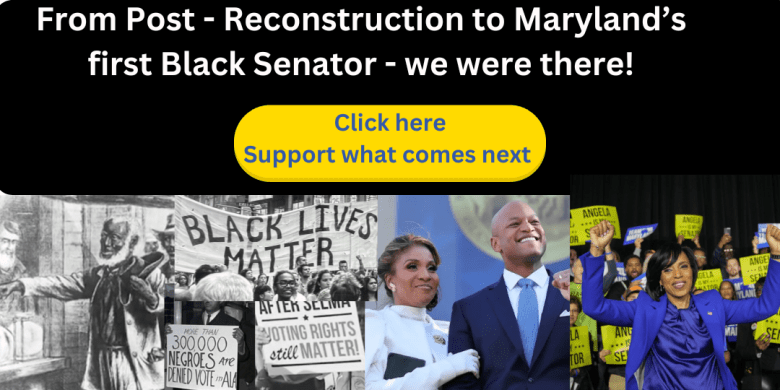By Tashi McQueen
AFRO Staff Writer
tmcqueen@afro.com
Mayor Brandon M. Scott (D) has officially swore in nine members of the newly formed Community Reinvestment and Reparations Commission for Baltimore City on Nov. 13.
The commission will be led by Sadiq Ali; Inte’a DeShields; Andre Turner; Anthony Francis; Agzja Carey; Eric Jackson; Dr. Raymond Winbush; Khalilah M. Harris and Rev. Dr. Robert Turner.

Scott spoke with the AFRO about how the new entity came to be.
“When the Maryland General Assembly legalized adult recreational cannabis use, they also mandated that a percentage of adult-use cannabis tax revenues be set aside and allocated to the State Community Reinvestment and Repair Fund,” said Scott. “From there, funding is provided to each jurisdiction in the state to support community-based initiatives that benefit low-income communities and communities that have been disproportionately impacted by the enforcement of the cannabis prohibition.”
“Our Community Reinvestment and Reparations Commission is tasked with two things: determining for which purposes these funds can be used, and directing the expenditure of funding to community-based organizations for services and programs intended to benefit our hardest hit communities in accordance with state law,” said Scott.
Adult-use cannabis was legalized on July 1, 2023. Baltimore joins other parts of the state, such as Baltimore County, in creating a commission to help reinvest the funds made from sales of the popular plant.
“We’re trying to make sure that we help prevent the cycle of crime,” said Pastor Robert Turner of Empowerment Temple African Methodist Episcopal Church, a new member of the commission. “We always believe that people want to do right and want to do good. It’s our role as a society, and now as a commission, to try and help make sure we present to them as many options to do good as possible.”
The swearing-in ceremony was well-attended by friends, family and state and local leaders.
“This is an opportunity to really demonstrate what a reparations policy will look like in practice,” said Davon Love, the director of public policy for Leaders of a Beautiful Struggle, about the new commission. “I think a lot of times people have talked about it theoretically, this opportunity to really show what it could look like.”
Love said he believes reparations for slavery could also happen in Baltimore City.
“As far as I’m concerned, this is a start in that direction,” said Love.
Inte’a DeShields, a member of the commission, reflected on how she felt at the ceremony and her new role.
“This is my first time ever going through this experience,” said DeSheilds. “I think the swearing-in adds a level of weight and responsibility to the role of a member of the community reinvestment and reparations committee.”
DeSheilds responded to potential concerns about whether Black Baltimoreans who have been impacted by the excessive enforcement of cannabis will see the investments.
“A quick look at the commission members will give you an idea that we are committed to making sure that the Black residents of Baltimore City and our communities receive what is due to them,” said DeShields. “Reparations, in this case, are intended to make sure that our people receive some benefit from the disenfranchisement and the systemic policies of the past that of course still affect our people.”
Khalilah Harris, a member of the commission, shared her perspective on the momentous time before Baltimore.
“I am super excited. This is historic,” said the 46-year-old. “This is a first that’s important to make sure that we are partners with our neighbors in the city to collaborate for building a stronger Baltimore. We want to be able to unlock the genius that we know lives in neighborhoods that were depressed and oppressed based on over policing and damaging enforcement of a prohibition on cannabis.”
Harris said partnering with other jurisdictions in the state is a top agenda item for the commission as they get to work. “There may be opportunities for us to bring dollars together so that we can have even greater impact across the state.”
“We also want to tap into the national reparations movement,” said Harris. “Baltimore can truly be a North Star for other communities on how we do reparations, not only for the fake war on drugs, but for historic challenges that the community has faced leading up to that.”
Scott encouraged other community members to step forward and join a commission.
“If you love Baltimore, you care about Baltimore, there is a commission for you,” said Scott. “Simply visit our website, baltimorecity.gov, and if you see a commission that you’re interested in, please make sure that you apply.”


